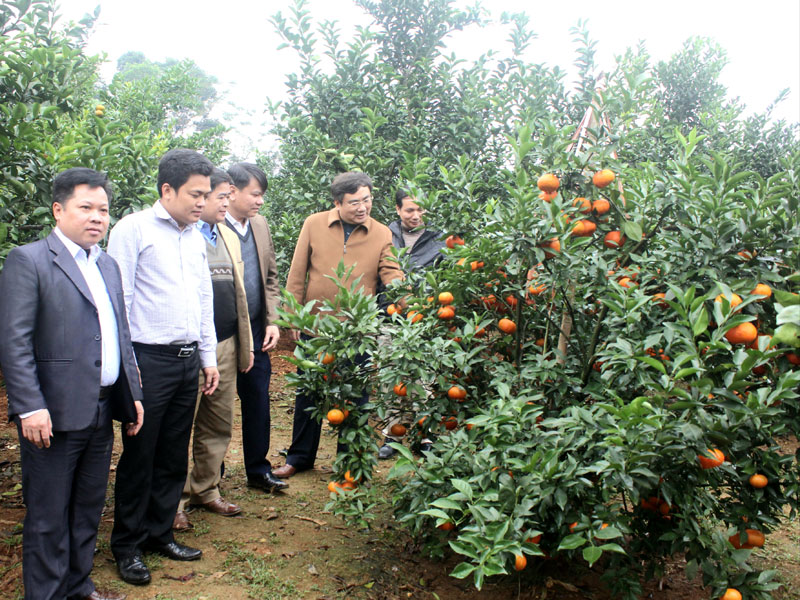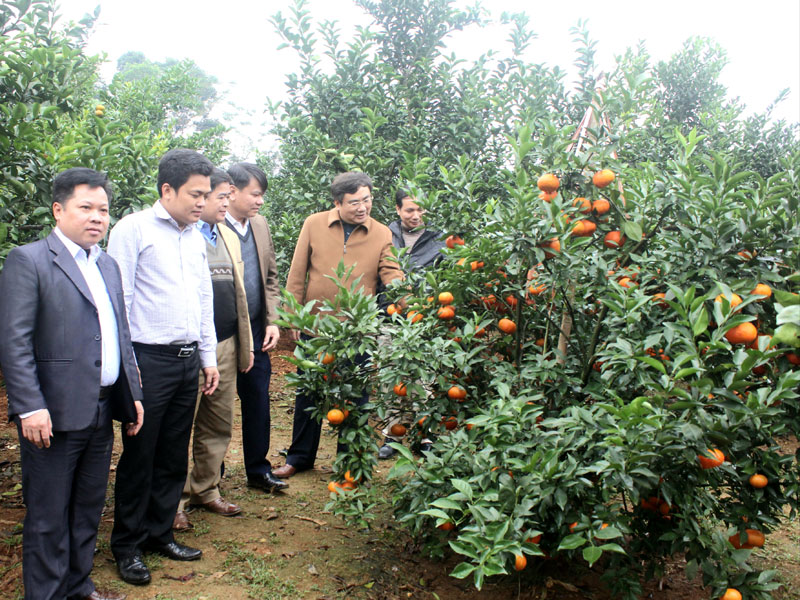
(HBO) – With great determination, tenacious efforts and innovative mind, Hoa Binh province has reaped significant results in implementing the national target programme on building new-style rural areas in the 2010-20, despite unfavourable start.
The province is among leading localities nationwide in
building new-style rural areas, as it was awarded the third-class Labour Order for
its outstanding achievements in the 10-year implementation of the programme.
 Leaders of the
Department of Agriculture and Rural Development survey a model of production
development in combination with new-style rural building in Lac Son district.
Leaders of the
Department of Agriculture and Rural Development survey a model of production
development in combination with new-style rural building in Lac Son district.
Ten years ago, the programme on building new-style rural
areas began in the province, with just two communes meeting 10 criteria.
Meanwhile, 124 communes fulfilled less than five criteria, and on average each
commune met 4.4 criteria. Some criteria remained difficult to satisfy, such as transportation,
irrigation, school and number of poor households.
Thanks to firm determination, the whole political system
strived to fulfil targets of building new-style rural areas. Even Da Bac, the
most disadvantaged mountainous district of the province, has made appropriate
steps for no one left behind.
After a decade, various measures were adopted to remove
bottlenecks in the implementation of the programme.
Rural infrastructure has been upgraded, along with
production and life quality. The political system has operated effectively and
living conditions of rural residents have improved remarkably.
In 2019, per capita income in the rural areas was over 32
million VND (1,385 USD) per annum, rising by 23.7 million VND compared to that
in 2011. The rate of poor households in the areas stayed at about 14.28
percent, a decline of 17.23 percent from 2011.
At the end of last year, the province had no commune meeting
less than 10 criteria, while each commune fulfiled 15.1 criteria on average. As
many as 88 out of 191 communes have been recognised as new-style rural areas,
or 46 percent of the total, surpassing targets in the Resolution of the 16th
Congress of the provincial Party Organisation.
Hoa Binh city has completed the programme while Luong Son
district has finished its dossier to seek the Prime Minister’s recognition as a
new-style rural district. Those are impressive accomplishments during the
10-year "revolution” in building new-style rural areas, which help the province
move towards higher goals, contributing to its comprehensive socio-economic
development./.
According to data from the Hoa Binh Provincial Party Committee, the industrial production index for the first six months of 2025 is estimated to have increased by 20% compared to the same period last year. This marks the highest year-on-year growth rate for this period since 2020.
In the first six months of 2025, Hoa Binh province’s export turnover was estimated at 1.145 billion USD, marking an 18.11% increase compared to the same period in 2024. Import turnover was estimated at $ 804 million, a 17.15% increase, which helped the province maintain a positive trade balance.
The lives of the ethnic minority farmers in Tan Lac district have gradually improved thanks to the new directions in agricultural production. This is a testament to the collective strength fostered through the professional associations and groups implemented by various levels of the district’s Farmers’ Union.
With the motto the "product quality comes first,” after nearly one year of establishment and operation, Muong village’s Clean Food Agricultural and Commercial Cooperative, located in Cau Hamlet, Hung Son Commune (Kim Boi district), has launched reputable, high-quality agricultural products to the market that are well-received by consumers. The products such as Muong village’s pork sausage, salt-cured chicken, and salt-cured pork hocks have gradually carved out a place in the market and they are on the path to obtaining the OCOP certification.
In the past, the phrase "bumper harvest, rock-bottom prices" was a familiar refrain for Vietnamese farmers engaged in fragmented, small-scale agriculture. But today, a new spirit is emerging across rural areas of Hoa Binh province - one of collaboration, organisation, and collective economic models that provide a stable foundation for production.
Maintaining growing area codes and packing facility codes in accordance with regulations is a mandatory requirement for agricultural products to be eligible for export. Recently, the Department of Agriculture and Environment of Hoa Binh province has intensified technical supervision of designated farming areas and packing facilities to safeguard the "green passport" that enables its products to access international markets.



 Leaders of the
Department of Agriculture and Rural Development survey a model of production
development in combination with new-style rural building in Lac Son district.
Leaders of the
Department of Agriculture and Rural Development survey a model of production
development in combination with new-style rural building in Lac Son district.